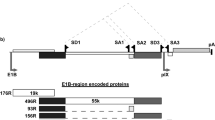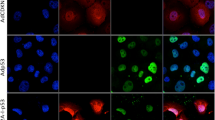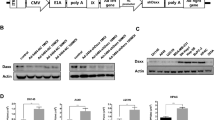Abstract
Clinical efficacy of adenovirus-mediated cancer gene therapy has been limited thus far. To improve its oncolytic effect, a replication-competent adenoviral vector was previously constructed to express high levels of p53 at a late time point in the viral life cycle. p53 expression from this vector improved tumor cell killing and viral spread in vitro. However, p53 function is antagonized by cellular mdm2 and adenoviral E1b-55kD, both of which are known to bind to and inactivate p53. Therefore, a new vector (Adp53W23S) that expresses a modified p53 transgene, which does not bind to E1b-55kD and mdm2, was constructed. The modified p53 protein was demonstrated to have a substantially prolonged half-life, and its localization was predominantly nuclear. Viral replication was unaffected by expression of the modified p53 and cancer cell killing was improved in vitro. However, in a xenograft model, efficacy was not significantly different from control virus. In conclusion, expression of a degradation-resistant p53 transgene late in the life cycle of a replication-competent adenovirus improves p53 stability and cancer cell killing in vitro. However, other factors, such as the adenoviral E1b-19kD and E1a proteins, which oppose p53 function, and limitations to viral spread need to be addressed to further improve in vivo efficacy.
This is a preview of subscription content, access via your institution
Access options
Subscribe to this journal
Receive 12 print issues and online access
$259.00 per year
only $21.58 per issue
Buy this article
- Purchase on Springer Link
- Instant access to full article PDF
Prices may be subject to local taxes which are calculated during checkout








Similar content being viewed by others
References
Vousden KH, Lu X . Live or let die: the cell's response to p53. Nat Rev Cancer 2002; 2: 594–604.
Vogelstein B, Lane D, Levine AJ . Surfing the p53 network. Nature 2000; 408: 307–310.
Nielsen LL, Dell J, Maxwell E, Armstrong L, Maneval D, Catino JJ . Efficacy of p53 adenovirus-mediated gene therapy against human breast cancer xenografts. Cancer Gene Ther 1997; 4: 129–138.
Liu TJ, Zhang WW, Taylor DL, Roth JA, Goepfert H, Clayman GL . Growth suppression of human head and neck cancer cells by the introduction of a wild-type p53 gene via a recombinant adenovirus. Cancer Res 1994; 54: 3662–3667.
Mujoo K, Maneval DC, Anderson SC, Gutterman JU . Adenoviral-mediated p53 tumor suppressor gene therapy of human ovarian carcinoma. Oncogene 1996; 12: 1617–1623.
Zhang WW, Alemany R, Wang J, Koch PE, Ordonez NG, Roth JA . Safety evaluation of Ad5CMV-p53 in vitro and in vivo. Hum Gene Ther 1995; 6: 155–164.
Scardigli R, Bossi G, Blandino G, Crescenzi M, Soddu S, Sacchi A . Expression of exogenous wt-p53 does not affect normal hematopoiesis: implications for bone marrow purging. Gene Therapy 1997; 4: 1371–1378.
Liu Q, Gazitt Y . Adenovirus-mediated delivery of p53 results in substantial apoptosis to myeloma cells and is not cytotoxic to flow-sorted CD34(+) hematopoietic progenitor cells and normal lymphocytes. Exp Hematol 2000; 28: 1354–1362.
Kawabe S, Munshi A, Zumstein LA, Wilson DR, Roth JA, Meyn RE . Adenovirus-mediated wild-type p53 gene expression radiosensitizes non-small cell lung cancer cells but not normal lung fibroblasts. Int J Radiat Biol 2001; 77: 185–194.
Schuler M, Rochlitz C, Horowitz JA, Schlegel J, Perruchoud AP, Kommoss F et al. A phase I study of adenovirus-mediated wild-type p53 gene transfer in patients with advanced non-small cell lung cancer. Hum Gene Ther 1998; 9: 2075–2082.
Swisher SG, Roth JA, Nemunaitis J, Lawrence DD, Kemp BL, Carrasco CH et al. Adenovirus-mediated p53 gene transfer in advanced non-small-cell lung cancer. J Natl Cancer Inst 1999; 91: 763–771.
Lang FF, Bruner JM, Fuller GN, Aldape K, Prados MD, Chang S et al. Phase I trial of adenovirus-mediated p53 gene therapy for recurrent glioma: biological and clinical results. J Clin Oncol 2003; 21: 2508–2518.
Buller RE, Runnebaum IB, Karlan BY, Horowitz JA, Shahin M, Buekers T et al. A phase I/II trial of rAd/p53 (SCH 58500) gene replacement in recurrent ovarian cancer. Cancer Gene Ther 2002; 9: 553–566.
Pagliaro LC, Keyhani A, Williams D, Woods D, Liu B, Perrotte P et al. Repeated intravesical instillations of an adenoviral vector in patients with locally advanced bladder cancer: a phase I study of p53 gene therapy. J Clin Oncol 2003; 21: 2247–2253.
Roth JA, Swisher SG, Merritt JA, Lawrence DD, Kemp BL, Carrasco CH et al. Gene therapy for non-small cell lung cancer: a preliminary report of a phase I trial of adenoviral p53 gene replacement. Semin Oncol 1998; 25 (Suppl 8): 33–37.
Zeimet AG, Marth C . Why did p53 gene therapy fail in ovarian cancer? Lancet Oncol 2003; 4: 415–422.
Schuler M, Herrmann R, De Greve JL, Stewart AK, Gatzemeier U, Stewart DJ et al. Adenovirus-mediated wild-type p53 gene transfer in patients receiving chemotherapy for advanced non-small-cell lung cancer: results of a multicenter phase II study. J Clin Oncol 2001; 19: 1750–1758.
Nemunaitis J, Khuri F, Ganly I, Arseneau J, Posner M, Vokes E et al. Phase II trial of intratumoral administration of ONYX-015, a replication-selective adenovirus, in patients with refractory head and neck cancer. J Clin Oncol 2001; 19: 289–298.
Khuri FR, Nemunaitis J, Ganly I, Arseneau J, Tannock IF, Romel L et al. A controlled trial of intratumoral ONYX-015, a selectively-replicating adenovirus, in combination with cisplatin and 5-fluorouracil in patients with recurrent head and neck cancer [see comments]. Nat Med 2000; 6: 879–885.
Harrison D, Sauthoff H, Heitner S, Jagirdar J, Rom W, Hay J . Wild-type adenovirus decreases tumor xenograft growth, but despite viral persistence complete tumor responses are rarely achieved-deletion of the viral E1b-19kDa gene increases the oncolytic effect. Hum Gene Ther 2001; 12: 1323–1332.
Sauthoff H, Pipiya T, Heitner S, Chen S, Norman RG, Rom WN et al. Late expression of p53 from a replicating adenovirus improves tumor cell killing and is more tumor cell specific than expression of the adenoviral death protein. Hum Gene Ther 2002; 13: 1859–1871.
Kubbutat MH, Jones SN, Vousden KH . Regulation of p53 stability by Mdm2. Nature 1997; 387: 299–303.
Haupt Y, Maya R, Kazaz A, Oren M . Mdm2 promotes the rapid degradation of p53. Nature 1997; 387: 296–299.
Reifenberger G, Liu L, Ichimura K, Schmidt EE, Collins VP . Amplification and overexpression of the MDM2 gene in a subset of human malignant gliomas without p53 mutations. Cancer Res 1993; 53: 2736–2739.
Teoh G, Urashima M, Ogata A, Chauhan D, DeCaprio JA, Treon SP et al. MDM2 protein overexpression promotes proliferation and survival of multiple myeloma cells. Blood 1997; 90: 1982–1992.
Watanabe T, Hotta T, Ichikawa A, Kinoshita T, Nagai H, Uchida T et al. The MDM2 oncogene overexpression in chronic lymphocytic leukemia and low-grade lymphoma of B-cell origin. Blood 1994; 84: 3158–3165.
Wunder JS, Eppert K, Burrow SR, Gokgoz N, Bell RS, Andrulis IL et al. Co-amplification and overexpression of CDK4, SAS and MDM2 occurs frequently in human parosteal osteosarcomas. Oncogene 1999; 18: 783–788.
Grand RJ, Owen D, Rookes SM, Gallimore PH . Control of p53 expression by adenovirus 12 early region 1A and early region 1B 54K proteins. Virology 1996; 218: 23–34.
Querido E, Marcellus RC, Lai A, Charbonneau R, Teodoro JG, Ketner G et al. Regulation of p53 levels by the E1B 55-kilodalton protein and E4orf6 in adenovirus-infected cells. J Virol 1997; 71: 3788–3798.
Roth J, Konig C, Wienzek S, Weigel S, Ristea S, Dobbelstein M . Inactivation of p53 but not p73 by adenovirus type 5 E1B 55-kilodalton and E4 34-kilodalton oncoproteins. J Virol 1998; 72: 8510–8516.
Querido E, Blanchette P, Yan Q, Kamura T, Morrison M, Boivin D et al. Degradation of p53 by adenovirus E4orf6 and E1B55K proteins occurs via a novel mechanism involving a Cullin-containing complex. Genes Dev 2001; 15: 3104–3117.
Harada JN, Shevchenko A, Pallas DC, Berk AJ . Analysis of the adenovirus E1B-55K-anchored proteome reveals its link to ubiquitination machinery. J Virol 2002; 76: 9194–9206.
Kussie PH, Gorina S, Marechal V, Elenbaas B, Moreau J, Levine AJ et al. Structure of the MDM2 oncoprotein bound to the p53 tumor suppressor transactivation domain. Science 1996; 274: 948–953.
Lin J, Chen J, Elenbaas B, Levine AJ . Several hydrophobic amino acids in the p53 amino-terminal domain are required for transcriptional activation, binding to mdm-2 and the adenovirus 5 E1B 55kDa protein. Genes Dev 1994; 8: 1235–1246.
Sauthoff H, Heitner S, Rom WN, Hay JG . Deletion of the adenoviral E1b-19kDa gene enhances tumor cell killing of a replicating adenoviral vector. Hum Gene Ther 2000; 11: 379–388.
Sauthoff H, Hu J, Maca C, Goldman M, Heitner S, Yee H et al. Intratumoral spread of wild-type adenovirus is limited after local injection of human xenograft tumors: virus persists and spreads systemically at late time points. Hum Gene Ther 2003; 14: 425–433.
Zhao LY, Liao D . Sequestration of p53 in the cytoplasm by adenovirus type 12 E1B 55-kilodalton oncoprotein is required for inhibition of p53-mediated apoptosis. J Virol 2003; 77: 13171–13181.
Bischoff J, Kirn D, Williams A, Heise C, Horn S, Muna M et al. An adenovirus mutant that replicates selectively in p53 deficient human tumor cells. Science 1996; 274: 373–376.
Demidenko ZN, Blagosklonny MV . Flavopiridol induces p53 via initial inhibition of Mdm2 and p21 and, independently of p53, sensitizes apoptosis-reluctant cells to tumor necrosis factor. Cancer Res 2004; 64: 3653–3660.
Kaeser MD, Pebernard S, Iggo RD . Regulation of p53 stability and function in HCT116 colon cancer cells. J Biol Chem 2004; 279: 7598–7605.
Debbas M, White E . Wild-type p53 mediates apoptosis by E1A, which is inhibited by E1B. Genes Dev 1993; 7: 546–554.
Chiou SK, White E . p300 binding by E1A cosegregates with p53 induction but is dispensable for apoptosis. J Virol 1997; 71: 3515–3525.
Liu TC, Hallden G, Wang Y, Brooks G, Francis J, Lemoine N et al. An E1B-19kDa gene deletion mutant adenovirus demonstrates tumor necrosis factor-enhanced cancer selectivity and enhanced oncolytic potency. Mol Ther 2004; 9: 786–803.
Scolnick DM, Chehab NH, Stavridi ES, Lien MC, Caruso L, Moran E et al. CREB-binding protein and p300/CBP-associated factor are transcriptional coactivators of the p53 tumor suppressor protein. Cancer Res 1997; 57: 3693–3696.
Ard PG, Chatterjee C, Kunjibettu S, Adside LR, Gralinski LE, McMahon SB . Transcriptional regulation of the mdm2 oncogene by p53 requires TRRAP acetyltransferase complexes. Mol Cell Biol 2002; 22: 5650–5661.
Hobom U, Dobbelstein M . E1B-55-kilodalton protein is not required to block p53-induced transcription during adenovirus infection. J Virol 2004; 78: 7685–7697.
Somasundaram K, El-Deiry WS . Inhibition of p53-mediated transactivation and cell cycle arrest by E1A through its p300/CBP-interacting region. Oncogene 1997; 14: 1047–1057.
Lill NL, Grossman SR, Ginsberg D, DeCaprio J, Livingston DM . Binding and modulation of p53 by p300/CBP coactivators. Nature 1997; 387: 823–827.
Koch P, Gatfield J, Lober C, Hobom U, Lenz-Stoppler C, Roth J et al. Efficient replication of adenovirus despite the overexpression of active and nondegradable p53. Cancer Res 2001; 61: 5941–5947.
Kim M, Zinn KR, Barnett BG, Sumerel LA, Krasnykh V, Curiel DT et al. The therapeutic efficacy of adenoviral vectors for cancer gene therapy is limited by a low level of primary adenovirus receptors on tumour cells. Eur J Cancer 2002; 38: 1917–1926.
Pipiya T, Sauthoff H, Huang YQ, Chang B, Cheng J, Heitner S et al. Hypoxia reduces adenoviral replication in cancer cells by down-regulation of viral protein expression. Gene Therapy 2005; 12: 911–917.
Doronin K, Toth K, Kuppuswamy M, Ward P, Tollefson AE, Wold WS . Tumor-specific, replication-competent adenovirus vectors overexpressing the adenovirus death protein. J Virol 2000; 74: 6147–6155.
Sova P, Ren XW, Ni S, Bernt KM, Mi J, Kiviat N et al. A tumor-targeted and conditionally replicating oncolytic adenovirus vector expressing TRAIL for treatment of liver metastases. Mol Ther 2004; 9: 496–509.
Freytag SO, Stricker H, Pegg J, Paielli D, Pradhan DG, Peabody J et al. Phase I study of replication-competent adenovirus-mediated double-suicide gene therapy in combination with conventional-dose three-dimensional conformal radiation therapy for the treatment of newly diagnosed, intermediate- to high-risk prostate cancer. Cancer Res 2003; 63: 7497–7506.
Freytag SO, Khil M, Stricker H, Peabody J, Menon M, DePeralta-Venturina M et al. Phase I study of replication-competent adenovirus-mediated double suicide gene therapy for the treatment of locally recurrent prostate cancer. Cancer Res 2002; 62: 4968–4976.
Wildner O, Morris JC, Vahanian NN, Ford Jr H, Ramsey WJ, Blaese RM . Adenoviral vectors capable of replication improve the efficacy of HSVtk/GCV suicide gene therapy of cancer. Gene Therapy 1999; 6: 57–62.
Lambright ES, Amin K, Wiewrodt R, Force SD, Lanuti M, Propert KJ et al. Inclusion of the herpes simplex thymidine kinase gene in a replicating adenovirus does not augment antitumor efficacy. Gene Therapy 2001; 8: 946–953.
Nanda D, Vogels R, Havenga M, Avezaat CJ, Bout A, Smitt PS . Treatment of malignant gliomas with a replicating adenoviral vector expressing herpes simplex virus-thymidine kinase. Cancer Res 2001; 61: 8743–8750.
Kurihara T, Brough DE, Kovesdi I, Kufe DW . Selectivity of a replication-competent adenovirus for human breast carcinoma cells expressing the MUC1 antigen. J Clin Invest 2000; 106: 763–771.
Hawkins LK, Hermiston T . Gene delivery from the E3 region of replicating human adenovirus: evaluation of the E3B region. Gene Therapy 2001; 8: 1142–1148.
Hawkins LK, Hermiston TW . Gene delivery from the E3 region of replicating human adenovirus: evaluation of the ADP region. Gene Therapy 2001; 8: 1132–1141.
van Beusechem VW, van den Doel PB, Grill J, Pinedo HM, Gerritsen WR . Conditionally replicative adenovirus expressing p53 exhibits enhanced oncolytic potency. Cancer Res 2002; 62: 6165–6171.
Geoerger B, Vassal G, Opolon P, Dirven CM, Morizet J, Laudani L et al. Oncolytic activity of p53-expressing conditionally replicative adenovirus AdD24-p53 against human malignant glioma. Cancer Res 2004; 64: 5753–5759.
Acknowledgements
We thank Robert Norman for statistical advice and Hal Rosenblatt for careful reading of the manuscript. This work was supported by NIH-NCI R01CA89086, NIH-NCI R01CA102053, NIH-NCRR grant MO1RR-00096, Stony Wold-Herbert Fund, Goldring Clinical Scholars Fund, DVA Advanced Research Career Development Award.
Author information
Authors and Affiliations
Corresponding author
Rights and permissions
About this article
Cite this article
Sauthoff, H., Pipiya, T., Chen, S. et al. Modification of the p53 transgene of a replication-competent adenovirus prevents mdm2- and E1b-55kD-mediated degradation of p53. Cancer Gene Ther 13, 686–695 (2006). https://doi.org/10.1038/sj.cgt.7700936
Received:
Revised:
Accepted:
Published:
Issue Date:
DOI: https://doi.org/10.1038/sj.cgt.7700936
Keywords
This article is cited by
-
Armed replicating adenoviruses for cancer virotherapy
Cancer Gene Therapy (2009)
-
Reprogrammed viruses as cancer therapeutics: targeted, armed and shielded
Nature Reviews Microbiology (2008)
-
Mechanisms of apoptosis regulation by viral oncogenes in infection and tumorigenesis
Cell Death & Differentiation (2006)
-
Mitochondrially targeted wild-type p53 suppresses growth of mutant p53 lymphomas in vivo
Oncogene (2006)



